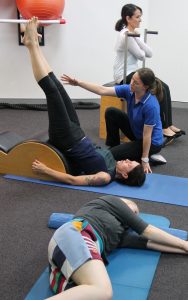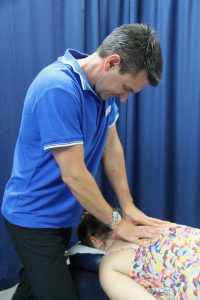
Are neck-related headaches common?
Headache is the world’s most common pain disorder & affects 66% of the global population. Research shows that up to 22% of headaches are either partly or fully driven by problems in the neck. When the neck, which is officially called the cervical spine, is producing your headache it is called a cervicogenic headache. Studies also show that assessment & treatment by an appropriately trained physiotherapist is effective for treating these neck-related or cervicogenic headaches.
How can my problems in my neck give me a headache?
Several structures in the neck, primarily those in the upper neck or “sub occipital (C1-3)” region can produce cervicogenic headaches. They include the spinal joints (facet or zygapophyseal joints), muscles, & discs (especially the C2/3 disc). Restriction, tightness or inflammation in any of these areas can affect neural processing in an area called the trigeminocervical nucleus (TCN) & cause pain referral along the trigeminal nerve to the head & face area.
It is important to remember that many people with neck-related headaches do not have a history of neck trauma or even significant isolated neck pain. At Central Performance we treat a large number of headache sufferers & we find that mostly it is related to their posture, with no specific separate neck issues. Often people have tried regular painkillers, heat/cold or massage, but have only found temporary relief.
How can I tell if my headaches are coming from my neck?
Diagnosing different types of headache can be tricky because people may have more than one type of headache at any given time. However cervicogenic headaches do have some common patterns & features, so if you know what to look for you can quickly get an idea of whether your neck is likely to be part of your problems. Use these 4 simple tests to help you decide if you should get your neck checked out to see if it is causing some or all of your headaches.
Test 1: back-to-front radiation
Most cervicogenic headaches start from the back of the skull & then radiate forwards to the temples, cheek, forehead, eye or jaw area.
Test 2: the pain is worse on one side, & doesn’t swap sides
The pain is normally on one side or at least worse on one side, & rarely swaps sides.
Test 3: neck posture or position can increase or reduce the headache
Often gentle movement or stretching of the neck will at least temporarily ease the headache. Sustained poor postures such as looking down at a screen, iPad or phone will usually increase the headache.
Test 4: upper neck pressure can increase or reduce the headache
Firm pressure around the upper neck & base of the skull can temporarily increase or relieve the headache.
Using these 4 tests will help you quickly screen if your neck is likely to be contributing to your headaches. If these tests indicate that your neck is involved, seeing a physiotherapist who is trained & experienced in treating cervicogenic headaches is the best front-line management. At Central Performance our physio’s have all of the knowledge & experience required to help you. One of our Director’s, Chris Jackson, has a Master’s degree in Manipulative Physiotherapy which focusses heavily on spinal problems including upper neck pain & headaches, & has been treating cervicogenic patients for over 23 years.
How can physiotherapy help neck-related headaches?
There is extensive evidence showing that physiotherapy is effective in 3 key areas of management for these patients;
1. Accurate diagnosis & localisation of joint dysfunction
If you are unsure whether your headaches are coming from your neck we can assess you to confirm or rule out your neck as a cause of your problems. If we do not feel that your neck is the main cause of your problems we can discuss other possible causes, & can liaise with your GP if other investigation or management is required.
2. Manual therapy is effective for acute symptom relief
We can often bring patients fast relief from headache pain by using tailored hands-on treatment techniques including joint mobilisations, soft tissue releases, mobilisations-with-movement & trigger point releases. We also start to put you back in control of your symptoms by providing you with a home exercise program designed to re-inforce & build on the improvements made with hands-on treatment in the clinic. Another goal in the early stage is to allow you to significantly reduce or eliminate your medication use.
3. Clinical Pilates: Structured exercise to strengthen the spinal stabilisers & deep neck flexor muscles for effective long-term relief from headache symptoms
As your pain settles you get access to our great research-driven exercise programs for effective long-term symptom relief. Our Clinical Pilates program includes private & small-group sessions using individualised exercise programming specifically designed to strengthen the spinal stabiliser muscles. Restoring balance to your spinal mobility & stability systems is critical & effective in keeping you free of headaches into the future. Click for more info on Clinical Pilates or watch the video below.
[video_lightbox_vimeo5 video_id=”213023878″ width=”640″ height=”580″ auto_thumb=”1″]
Mixed Headaches
You may have headaches from different mechanisms at different times, & even different types of headaches occurring at the same time. Often one mechanism can set-off or aggravate another, so seeing a physiotherapist to effectively resolve the cervicogenic component of your headaches can provide significant relief even if some other mechanisms are involved as well.

Lastly, please remember that whilst headaches are very largely due to relatively benign causes, if you are experiencing lots more severe or frequent headaches, or if they have come on or increased very suddenly, you should definitely get them checked out ASAP. Your GP can help you, or if you are screened by one of our physio’s & we think you need further investigation we can refer you on to see the best person for you.


